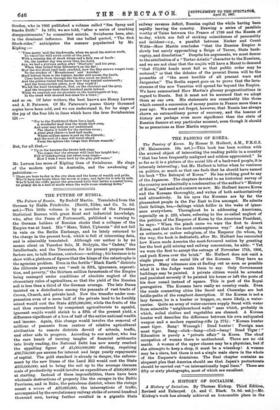THE FlJTURE OF RUSSIA.
The Future of Russia. By Rudolf Martin. Translated from the German by Hulda Friedrichs. (Smith, Elder, and Co. 7s. 6d. net.)—This little volume is by a member of the Prussian Statistical Bureau with great fiscal and industrial knowledge, who, after the Peace of Portsmouth, published a warning to the German holders of Russian stocks that a collapse of the Empire was at hand. His " Hone, Tekel, Upharsin" did not fall in vain on the Berlin Exchange, and he lately returned to the charge in the present book, which is full of interesting data, and is admirably translated. Although our author is by no means silent on Tsarsko5 Selo, M. Stolypin, the " Cadets," the Intellectuals, and the Terrorists, for his present purpose those factors are, to talk Russian, nietschewo—nothing ; his business is to show with a plethora of figures that the hinge of the catastrophe is the agrarian problem. Even in the fertile "Black Earth" districts the illiterate peasantry are "sunk in filth, ignorance, supersti- tion, and poverty," the thirteen million farmsteads of the Empire being managed under conditions of absolute neglect of the elementary rules of agriculture, so that the yield of the Russian soil is less than a third of the German average. The late Drama insisted on a distribution among the peasants of vast tracts of Crown, Church, and private land. Now the transfer under com- pensation even of a mere half of the private land to be forcibly seized would cost the State £225,000,000, while the fruits of the soil thus surrendered by competent agriculturists to squalid, ignorant mujiks would shrink to a fifth of the present yield, a difference significant of a loss of half of the entire national wealth and income. Again, this change would involve the removal of millions of peasants from centres of relative agricultural civilisation to remote districts devoid of schools, traffic, and other aids to progress. According to our author, who has the rare knack of turning tangles of financial arithmetic into lively reading, the National Debt has now nearly reached the appalling figure of £1,000,000,000 sterling, requiring
£ 36,750,000 per annum for interest and large yearly repayments of capital. The gold standard is already in danger, the enforce- ment by the new Boma of the Land Bill would cost the State
£ 225,000,000, and to bring the soil up to the average German scale of productivity would involve an expenditure of 8300,000,000 at starting. Instead of these impossibilities, there have been wholesale destructions of property like the ravages in the Baltic Provinces, and in Baku, the petroleum district, where the risings meant a minus of 825,000,000, the interruptions of traffic, accompanied by the revolutionary railway strike of several hundred thousand men, having further resulted in a gigantic State
railway revenue deficit, Russian capital the while having been rapidly leaving the country. Drawing a series of parallels worthy of Taine between the France of 1789 and the Rusela of to-day, which are full of striking coincidences of personality and incident=e.g., a parallel between Necker and Count Witte—Herr Martin concludes "that the Russian Empiro is slowly but surely approaching a Reign of Terror, State bank- ruptcy, and dissolution." Despite his arguments, we must demur to the attribution of a " Tartar-Asiatic " character to the Russians, and we are not clear that the mujiks will have a Marat to demand "that 270,000 heads must fall so that public order may be restored," or that the debates of the present Hume will be the preamble of "the most terrible of all peasant wars and Jacqueries." The Berlin expert goes on to prove that the lava- streams of the new Vesuvius will spread far beyond the Empire. We have summarised Herr Martin's gloomy prognostications in regard to Russia. But it must not be assumed that we adopt them as our own. His statements are remarkably like those which caused a succession of money panics in France mote than a year ago. We must not forget, however, that Russia has always shown an extraordinary power of recovery, and the lessons of history are perhaps even more significant than the state of Russian finance at any particular moment, even though it should be as precarious as Herr Martin supposes.


























































 Previous page
Previous page